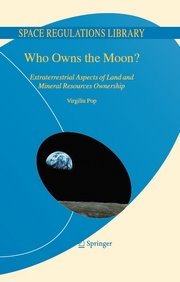Jeff Foust reviews "Unreal Estate" for The Space Review: (http://www.thespacereview.com/article/562/1):
"In the space advocacy community, a perennial area of concern has been property rights in space. The Outer Space Treaty of 1967 prevents countries from claiming sovereignty over the Moon or other “celestial bodies”, but the ability of individuals and corporations to lay claim to real estate beyond Earth is a murkier issue. Some people believe that the long-term commercialization of outer space is dependent on a resolution of this question that does grant some kind of property rights. In the meantime, though, the lack of a clear legal infrastructure that supports such property rights has not stopped many from claiming and selling real estate on the Moon, Mars, and other bodies in the solar system. The long, quixotic history of such efforts is the focus of Unreal Estate, a book by space law expert Virgiliu Pop.
While most efforts to lay claim to the Moon (the primary celestial body of interest for those seeking property in outer space) were stimulated by the opening of the Space Age and the race to the Moon in the 1960s, Pop traces such ownership claims back 250 years to Prussia, where King Frederick granted title to the Moon to a farmer with “healing powers” (a claim that only came to light in the 1990s when a descendant of that farmer contested the ownership claims of Dennis Hope’s “Lunar Embassy”.) In the 1940s, with World War 2 still raging across the globe, one American contacted the General Land Office (now part of the Bureau of Land Management) of the Department of the Interior, asking about how they could file homesteading claims on the Moon. The strong interest in space starting in the 1950s further stimulated interest in lunar, Martian, and other celestial real estate, primarily but not exclusively in the US.
In Unreal Estate Pop goes into great detail about outer space ownership claims, both famous and obscure, through the present day (almost literally: the book mentions interviews as recent as January 2006, remarkably recent in the book publishing world.) These ownership claims fall into a few broad categories. There are those efforts primarily intended to make money for the claimant through the sale of acreages on the Moon or elsewhere: the best known, but hardly only, example of this is the aforementioned Lunar Embassy, which has been selling extraterrestrial deeds since 1980. There have also been ownership claims designed to make money as fundraisers for museums, planetariums, and in one case, a high school sports complex in Romania. There has been claims made with tongue firmly planted in check, best exemplified by BuyUranus.com (whose deed registry is called the Real Estate Commission and Trust of Uranus Management; to see the humor, spell out the registry’s acronym.) There have also been a few cases where people have made claims not to make money but in a genuine, if ultimately futile, bid to make a statement regarding the legality of such property rights claims, such as Greg Nemitz’s claim on the asteroid Eros and his effort to get that claim recognized by the US government.
While most of Unreal Estate is a historical examination of the various claims of extraterrestrial property rights claims, Pop does devote a final chapter to the legality of such claims. While such claims are a “trivial issue” for space law experts, who don’t give them a second thought, the same is not true for the general public: “The issue has hijacked the public perception of the space law.” So Pop spends several pages deconstructing the Lunar Embassy’s claims in particular, using several lines of argument: that others filed claims to ownership of the Moon prior to Hope, that government recognition of such claims in general would be in conflict with the Outer Space Treaty, and that those who make such claims lack the physical ability to take possession of their property. Such arguments, however, have not deterred Hope, who is now petitioning the state of Nevada, where his company is headquartered, “to recognize us as a visiting government and embassy.”
One question that Pop does not address in detail in Unreal Estate is why there is so much public interest in owning property on the Moon and other worlds. In several cases Pop writes that people that offered “deeds” to property on the Moon and Mars were overwhelmed with demand. It seems that few of the people who have purchased stakes on other worlds are real estate speculators who expect to somehow exploit—let alone visit—their tracts. For the vast majority, such claims are seen as novelty items, akin to the “name a star” promotions that draw the ire of professional astronomers: even the Lunar Embassy, Pop notes, recognizes its deeds as “novel gifts”. Eventually the issue of outer space property rights will have to be tackled in a serious way, through treaties or case law, if there is to be any significant human presence beyond Earth. Until then, Unreal Estate reminds us there are plenty of people willing to claim and sell more dubious stakes of cosmic property."
Monday, February 27, 2006
Thespacereview.com: review "Unreal Estate"
Sunday, February 26, 2006
PR Leap: Land on the Moon for sale? Think twice! Lawyer Debunks “Unreal Estate” Business

(PRLEAP.COM) Before you purchase a certificate offering the Moon to the love of your life, check with space law expert Virgiliu Pop. In a groundbreaking book, “Unreal Estate – The Men who Sold the Moon”, Mr. Pop comes with legal arguments as to why one cannot actually buy extraterrestrial real estate.
During the past decade, mass-media has reported about individuals and companies that have claimed ownership of various celestial bodies and, in most of the cases, subsequently offered them for sale to the public. Nowadays, the number of “owners” of extraterrestrial real estate certificates from different companies is in the range of several million.
“The moon has been wished for since time immemorial” – said Mr Pop, who researched the history of lunar claims with media archives and interviewed several lunar claimants. “In the 1940’s, people were enquiring with the US Bureau of Land Management for lunar homesteads; in the 1950’s, deeds for square inches of lunar property were offered as premiums with morning cereals; in the 1960’s, the Moon and Venus were officially annexed by several municipalities. There is nothing new under the sun!”
Mr Pop, a native of Romania, is a specialist in space law and policy, writing-up a doctoral thesis at the University of Glasgow on the subject of landed property rights in outer space. A member of the International Institute of Space Law, Virgiliu has authored several acclaimed papers in the field of space law and policy. His dedication for the subject and the originality of his articles earned him the interest of the mass media, being interviewed by prestigious outlets as diverse as New Scientist, Space.com/MSNBC, The Space Show, La Tercera (Chile), Ta Nea (Greece), Geo Magazine (Germany) and many more.
“Who could be cooler than a space lawyer named Pop?” – exclaimed Jesse Londin, who maintains ‘Space Law Probe’, a blog specializing in space law. “If Virgil’s fascinating stories and characters from the annals of space property claims were the issues, I might never have fallen asleep during property class in law school”. In ‘Unreal Estate – The Men who Sold the Moon’, space law is climbing down the ivory tower, reaching the mainstream in the manner of ‘popularized science’ books. The book appeals to readers from all walks of life, from lawyers and real estate professionals to space aficionados.
“Virgiliu has done stellar research on this topic and his book is extremely informative and interesting” – declared Dr. David M. Livingston, founder and host of ‘The Space Show’. “You will find the stories he tells to be compelling, the legal arguments as to why one cannot own space real estate to be illuminating, and the entire book to be not only unique but very special”.
Unreal Estate: The Men who Sold the Moon
by Virgiliu Pop
Exposure Publishing, 2006
Paperback, 204 pp., illus., 6.0" x 9.0",
RRP US$ 15.99 / £9.99
ISBN 1846850959





